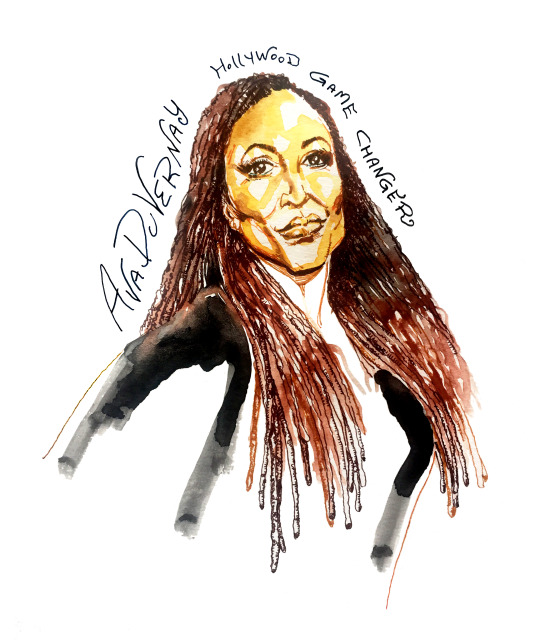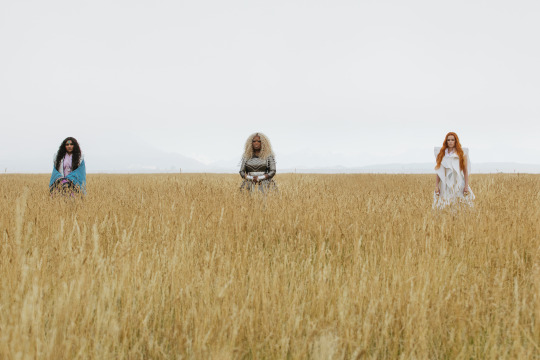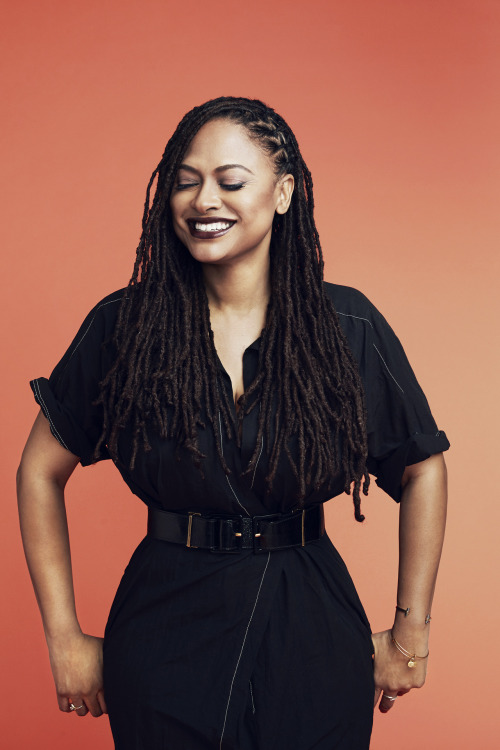#wrinkle in time

Credit:George McCalman
Ava DuVernay is a force in Hollywood, having made a name for herself not only as a director, producer and screenwriter, but as a champion of change. Now, more than ever, media representations that we see daily in print, on television, and in films are being called into question. But, for the past decade, Ava DuVernay’s mission has been to push for more inclusivity on sets and on screen. “Diversity is not just a box to check. It’s a reality that should be deeply felt and held and valued by all of us,” DuVernay said in an interview with Fast Company.
How did DuVernay become a Hollywood game changer?
Her story isn’t a straight line — it’s a series of pivots based on strong determination and the willingness to take chances to forge her own path. Born in Long Beach, California, DuVernay was raised in a matriarchal environment with lots of women who always encouraged her to follow her heart. She grew up near the Compton neighborhood of Los Angeles and was the first African American student body president at her high school. Film wasn’t her dream from the get-go. As an undergrad at UCLA, she pursued a major in African American studies, then shifted into the world of public relations after spending time as a journalist.

Ava DuVernay gave the commencement speech at the UCLA School of Theater, Film and Television in 2017. Photo credit: UCLA
At 27, she started her own public relations firm, The DuVernay Agency. As a film publicist, she was able to get close to different filmmakers, seeing how movies were made firsthand. This proximity to the world of film enamored her. While on a film set in East Los Angeles for the 2004 crime thriller, “Collateral,” DuVernay had an aha! moment when she realized that she wanted to be the one telling the stories, the one making the movies. “Javier Bardem was on set, and something about the scene with Javier and Jamie, this brown man and this black man: It was this gritty place in East L.A. at night, with a digital camera, and I just loved it,” she shared with Rolling Stone. “I started writing a script that weekend.“
In 2011, she self-financed “I Will Follow,” her first feature film she wrote and directed, after a few years of learning the film trade while working on shorts and documentaries. Just three years later, she directed the acclaimed “Selma,” a film about Martin Luther King Jr. and the 1965 Selma to Montgomery march. Following the release of “Selma,”DuVernay was the first African American female director to be nominated for an Academy Award for best picture. With the upcoming release of “A Wrinkle in Time,” boasting a budget exceeding $100 million, DuVernay is now the first African American woman to direct a live-action film with a budget of that size.
Ava DuVernay on her journey to become the first black woman to direct an Oscar nominated film. Credit: TIME
Beyond her notable accomplishments and series of “firsts,” she’s hoping to create a larger shift in Hollywood, one with varied voices and stories in cinema. Just three years ago, she expanded her film distribution company to become ARRAY, where female filmmakers and people of color are at the forefront. “It comes down to who gets to tell the story? If the dominant images that we have seen throughout our lifetime, our mother’s lifetime, our grandmother’s lifetime, have been dominated by one kind of person, and we take that, we internalize it, we drink it in as true, as fact. It’s tragic,” DuVernay wrote in Timemagazine. “It goes beyond the film industry. These are the images of ourselves we consume. It affects the way we see ourselves and the way other people see us.”
The world of film in the United States has been built and defined by the predominately white patriarchy. But with her courageous streak and fearless creativity, DuVernay is opening doors for women, people of color and those who have been underrepresented in the film industry for so long. By advocating for a diverse set of at least 50 percent people of color and women, DuVernay has put her own politics in action: “Inclusion is really half — half of the cast, half of the directors, half of the writers are women or girls, half of the room, more than half of the room is of color,” she shared with Ellemagazine. “I think we get really satisfied with less.” And she’s just getting started. For “A Wrinkle in Time,” DuVernay warned the each of the department heads on her crew not to submit the same list of hires unless they could prove they had considered others. In making inclusion a key nonnegotiable in her creative process, DuVernay is changing the narrative for how stories are told and who gets to tell them.

On March 9, be a warrior. The new trailer for A #WrinkleInTime is here.





Ava DuVernay at the Louis Vuitton Womenswear Fall/Winter 2022/2023 #ParisFashionWeek
Ava DuVernay is the first Black woman to direct a Hollywood movie with a budget of over $100 million. She’s directing the upcoming adaptation of A Wrinkle in Time (amazing), which is slated to include a performance by Oprah and come out some time in 2017. Once again, DuVernay is pushing Hollywood forward—how sad is it that no Black woman has had this opportunity before? This is another example where the lack of diversity in Hollywood comes into sharp focus—it’s worth remembering that at the biggest film studios in Hollywood, almost every single top executive is a white man.
Post link





